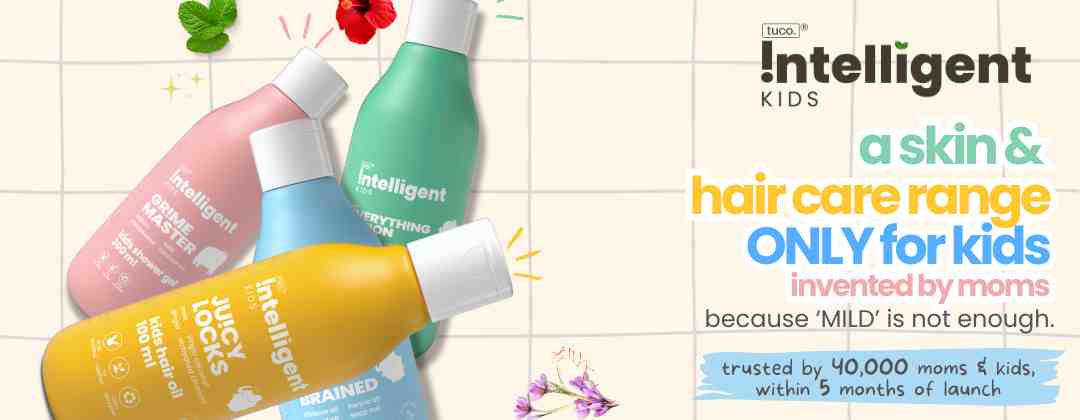In today's consumer-driven world, parents face a myriad of choices when it comes to selecting skincare products for their children. Among the multitude of options available, the debate between organic and non-organic skincare products often takes center stage. As parents, ensuring the health and well-being of our little ones is paramount, making it crucial to understand the differences between these two categories and their potential impact on our children's delicate skin.
Understanding Organic Skincare Products for Kids:
Organic skincare products are formulated using ingredients that are grown and processed without synthetic chemicals, pesticides, or genetically modified organisms (GMOs). These products are often certified by reputable organizations, such as the USDA Organic or COSMOS, which guarantee that they meet strict standards for organic production.
The benefits of organic ingredients for children's skincare are manifold. Organic ingredients are typically gentler on the skin, making them ideal for children with sensitive skin or conditions such as eczema. Furthermore, organic farming practices prioritize soil health and biodiversity, minimizing environmental impact and promoting sustainability.
Common organic ingredients found in kids' skincare products include soothing botanical extracts like chamomile and calendula, nourishing oils such as coconut and jojoba, and natural emollients like shea butter and cocoa butter. These ingredients provide hydration, protection, and nourishment for children's delicate skin without the use of harsh chemicals or synthetic additives.
Here's our range of natural skincare & haircare products for kids!
Exploring Non-Organic Kids' Skincare Products:
On the other hand, non-organic skincare products often contain synthetic ingredients, preservatives, fragrances, and other additives that may pose risks to children's skin health. While these products may offer benefits such as longer shelf life and lower cost, they may also contain potential allergens, irritants, or toxins that can be harmful, especially for children with sensitive skin.
Common synthetic ingredients found in non-organic kids' skincare products include parabens, phthalates, sulfates, and artificial fragrances. These ingredients are often used as preservatives, emulsifiers, or fragrances but may have adverse effects on the skin, such as irritation, allergic reactions, or hormone disruption.
Despite regulatory standards in place for non-organic skincare products, such as the FDA's guidelines for cosmetic safety, there are limitations to their oversight. Consumers must be vigilant in scrutinizing product labels and researching ingredients to make informed choices about the products they use on their children's skin.
Debunking Myths and Misconceptions:
There are several misconceptions surrounding organic and non-organic skincare products for kids that warrant clarification. One common misconception is that natural ingredients are always safe and effective, while synthetic ingredients are always harmful. In reality, the safety and efficacy of skincare ingredients depend on various factors, including concentration, formulation, and individual skin sensitivity.
Another misconception is that organic skincare products are always superior to non-organic alternatives. While organic products may offer certain benefits, such as being free from synthetic chemicals and pesticides, not all organic ingredients are suitable for children's skin, and not all non-organic ingredients are harmful.
It's essential to distinguish between natural and organic skincare products, as these terms are often used interchangeably but have distinct meanings. Natural skincare products contain ingredients derived from nature, while organic skincare products are certified to meet specific organic standards, ensuring that they are grown and processed without synthetic chemicals.
Safety Considerations for Children's Skincare Products:
When selecting skincare products for kids, safety should be a top priority. Children's skin is more delicate and sensitive than adults', making them more susceptible to irritation, allergic reactions, and other adverse effects from skincare products.
Both organic and non-organic skincare products may contain potential allergens or irritants, such as fragrances, essential oils, and certain botanical extracts. Patch testing new products on a small area of skin and observing for any adverse reactions is recommended, especially for children with known allergies or sensitivities.
Consulting dermatologists or pediatricians before introducing new skincare products to children is advisable, particularly for babies or children with pre-existing skin conditions such as eczema or dermatitis. Healthcare professionals can provide personalized recommendations based on individual skin needs and concerns.
Environmental and Ethical Implications:
In addition to considering the safety and efficacy of skincare products, parents may also weigh environmental and ethical factors when making purchasing decisions. Organic farming practices prioritize sustainability, soil health, and biodiversity, reducing reliance on synthetic chemicals and promoting environmental conservation.
Conversely, conventional agriculture methods used in non-organic skincare product production may contribute to environmental pollution, soil degradation, and habitat destruction. Consumers concerned about environmental impact may opt for organic skincare products to support eco-friendly farming practices and minimize their carbon footprint.
Ethical considerations, such as animal testing and fair labor practices, also play a role in the skincare industry. Many organic skincare brands are cruelty-free and ethically sourced, prioritizing animal welfare and worker rights in their supply chains. Supporting these brands aligns with values of compassion, sustainability, and social responsibility.
Making Informed Choices as Parents:
With the abundance of skincare products available on the market, making informed choices as parents can feel overwhelming. Several factors should be considered when selecting skincare products for children, including:
- Skin type: Consider whether your child has dry, oily, sensitive, or normal skin and choose products formulated to address their specific needs.
- Age: Babies and young children may require gentler formulations with fewer ingredients to minimize the risk of irritation.
- Ingredients: Read product labels carefully and avoid products containing potential allergens, irritants, or harmful chemicals.
- Certifications: Look for organic certifications from reputable organizations such as USDA Organic or COSMOS to ensure product quality and authenticity.
- Reviews: Research product reviews and testimonials from other parents to gauge product efficacy and safety before making a purchase.
- Budget: Consider your budget constraints and prioritize products that offer the best value in terms of safety, efficacy, and quality.
Case Studies and Testimonials:
Real-life experiences of parents who have switched to organic or non-organic skincare products for their children can offer valuable insights into the benefits and challenges of each option. Many parents report positive outcomes after transitioning to organic skincare products, such as improved skin health, reduced irritation, and peace of mind knowing that they are using safer, more natural alternatives.
However, transitioning to organic skincare products may require adjustments, both in terms of product availability and cost. Some parents may find that organic skincare products are more expensive or less readily available than non-organic alternatives, requiring them to prioritize certain products or explore alternative brands.
Conversely, parents who opt for non-organic skincare products may appreciate the convenience, affordability, and wide availability of these products. However, they may also encounter concerns regarding ingredient safety, efficacy, and long-term health effects, prompting them to reevaluate their skincare choices.
Insights into long-term benefits observed after making informed skincare choices can empower parents to prioritize their children's skin health and well-being. By sharing experiences and recommendations, parents can support one another in navigating the complexities of the skincare market and making choices that align with their values and priorities.
The Future of Kids' Skincare:
As consumer awareness of environmental and health issues continues to grow, the skincare industry is evolving to meet changing demands and preferences. Emerging trends in kids' skincare include:
- Clean beauty: A shift towards cleaner, more transparent formulations free from potentially harmful ingredients such as parabens, phthalates, and sulfates.
- Sustainable packaging: Increasing emphasis on eco-friendly packaging materials, such as recyclable, biodegradable, or refillable options, to reduce plastic waste and environmental impact.
- Plant-based ingredients: Growing interest in plant-based skincare ingredients with proven benefits for children's skin, such as aloe vera, green tea, and shea butter.
- Holistic wellness: Recognition of the interconnectedness between skin health, nutrition, and overall well-being, leading to the development of holistic skincare products that nourish both inside and out.
Check our our best-selling all natural shampoo for kids, made with reetha!
Consumer demand for organic and non-organic kids' skincare products is driving innovation and competition in the market, encouraging brands to prioritize safety, efficacy, and sustainability in their formulations and practices. By staying informed about industry trends and advancements, parents can make proactive choices that promote the health and happiness of their children.
In the ongoing debate between organic and non-organic skincare products for kids, there is no one-size-fits-all solution. Both options have their merits and considerations, and the choice ultimately depends on individual preferences, values, and priorities.
Organic skincare products offer the assurance of natural, eco-friendly ingredients grown and processed without synthetic chemicals or pesticides. They may be ideal for parents seeking safer, more sustainable alternatives for their children's delicate skin.
Non-organic skincare products, while often more affordable and accessible, may contain synthetic ingredients that carry potential risks and concerns for children's skin health. Parents should exercise caution when selecting these products and prioritize safety and efficacy above all else.
Whether opting for organic or non-organic skincare products, the key is to make informed choices that prioritize the health, safety, and well-being of our children. By understanding the nuances of each option, weighing safety considerations, and considering ethical and environmental implications, parents can navigate the skincare market with confidence and peace of mind.
In the end, it's not just about what we put on our children's skin but also about the values and principles we instill in them as they grow. By choosing skincare products that align with our values of health, sustainability, and compassion, we can set a positive example for future generations and pave the way for a brighter, healthier future for our children and the planet.




